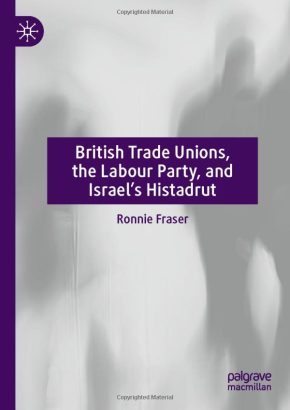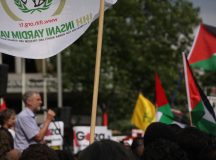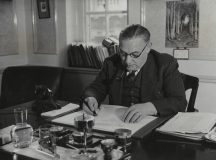Ronnie Fraser has been bravely fighting a sometimes lonely battle against antisemitism and anti-Zionism in the British trade union movement for decades. He briefly became a central figure in the debate due to his ultimately doomed legal challenge to the UCU (the lecturers’ union) over the way they had treated him and other Zionist Jewish members.
Fraser has lived this issue, but he manages admirably in his new book to step back and take a detached, academic and thoroughly researched and sourced look at the historical ups and downs of the relationship between British trade unions and Israel. It would have been easy to write an angry polemic about the capture of the unions by extreme anti-Israel campaigners, and Ronnie has a lot to be angry about, but he has resisted the urge, and instead produced a comprehensive guide (322 pages including an extensive bibliography and index) that will stand the test of time as an accurate record of changing union stances. It certainly shows remarkable self-discipline for Fraser to have dispassionately covered his own battles with UCU in just one paragraph, written in the third person, which dryly remarks ‘The complainant lost his action as the forty–nine page written judgment rejected all ten of his complaints ruling them out of time.’
Fraser divides the history into distinct periods. He avoids a simplistic narrative arc that there was a ‘good old days’ when the unions were onside, and instead concludes that ‘for the majority of that time the TUC has not been very supportive of Israel or the Histadrut, neither could they be considered or described as a pro-Zionist organisation’ – the main exception being a brief period of warm relations in the 1960s.
There’s a lot of detail to digest here. This isn’t a superficial look at policies passed at annual or biennial conferences, Fraser goes deep into the primary sources, interviews with living protagonists, minutes of key meetings, pamphlets, and memoirs to give analysis of the personalities involved, whether they were Israeli or British union leaders, diplomats, or British Jewish trade union activists. He systematically catalogues all the major contacts made between the TUC and Histadrut, down to the level of individual delegations and visits. He particularly captures the importance of the international trade union structures and the way in which the TUC and Histadrut interacted through those as well as bilaterally. He also grasps the way in which union policies and Labour Party policies – and, when in government, Labour Government policies – influence each other. This being a book about the unions it correctly includes material on the influence within them of the Communist Party of Great Britain and smaller far left parties as well as Labour. The unions are assessed not just as (in some cases) affiliates to the Labour Party, but as major players in British civil society in their own right, particularly between 1945 and 1979.
There’s nothing simplistic about Fraser’s analysis – he explains carefully the inter-relationship and balance of power between different individual and institutional actors in shaping policy, and how it changed over time. Everything is also placed in the context of the key wars, terrorist atrocities, diplomatic breakthroughs and other events in the Middle East and the UK’s foreign policy and wider public debate about them.
If I were to pick a bone with the analysis I think it hints too much at a deterministic view that Zionist Jewish influence in the unions was inevitably bound to decline as the British Jewish Community became more prosperous and less likely to be employed in heavily unionised workplaces; whilst perhaps understating the linkage with a wider decline of the organised moderate wing of the unions that took place during the Blair years. These saw a generation of union leaders, most of whom were not Jewish but who were broadly, if quietly, sympathetic to Israel as part of a wider pragmatic worldview, replaced by a new generation of left-wing general secretaries. This, too, followed an earlier generational change that took place within the Labour and union left and saw the left of the movement gradually change from being the more pro-Zionist wing to being almost universally anti-Zionist. Fraser himself lists the most prominent pro-Israel union leaders as having included ‘Sam Watson, Frank Cousins, Fred Hayday and Jack Jones, none of whom had any Jewish connections’ – the case for Israel in the unions hasn’t primarily been, and doesn’t need to be, made by Jewish members and leaders; it needs to be made by non-Jews who have been politically convinced of the justice of the cause of Jewish national self-determination. Neither has the pro-Palestinian movement gained influence in the unions due to demographic changes; it hasn’t been led by Palestinians, it gained it through a grassroots organising model and making itself part of a broader package of policy stances, industrial and political, pushed by the broad left in major unions. For instance, Sir Ken Jackson of the AEEU and subsequently Amicus doesn’t get mentioned in the book, when his defeat and replacement by Derek Simpson as General Secretary was a key moment in the decline of Israel’s allies on the union right and in the path to the creation through mergers of Unite as a left-orientated and anti-Israel mega-union.
Fraser has pulled together a treasure trove of material and crafted a convincing narrative from it. Serious students of Israel or of British trade unionism and anyone who cares about the relationship between the British left and Israel have been done a great service by him. Even the limited number of people with expertise or personal experience in this topic are going to find facts and vignettes that surprise them. I suspect the book will be read even by some of the most fervent anti-Zionists in the union movement, as it is their history too.
My criticism would be that whilst the final section on events since the 1980s is coherent and well written, it feels a little rushed and sketchy, a toboggan ride through 40 years of downward trajectory, compared to the very detailed account of the 1950s, ‘60s and ‘70s, which is a shame given that this recent and contemporary history is what will be of most interest to the wider politically-interested audience. It feels like Fraser had two books in him and tacked a precis of the second one onto the end of the detailed first one. Perhaps he can be enticed to revisit the post-1983 period, expand on what is there already and give us a second volume! Certainly his concluding paragraphs are over pessimistic, given the pace of political change on antisemitism in the Labour Party and the supportive role of three of the four largest Labour-affiliated unions (GMB, Unison and Usdaw) in pushing the party out of the Corbyn era and into the very different Starmer one. Fraser’s claim that the TUC and the Labour Party are ‘backing the PSC and the international BDS campaign’ is only half correct regarding the TUC (it backs a settlement goods boycott but not full BDS) and quite dramatically misrepresents Labour’s stance.
As Fraser has stuck to the history, someone also needs to write the polemic about what we actually do to rebuild support for Israel in the unions. It’s a tough task, but it needs doing.
































